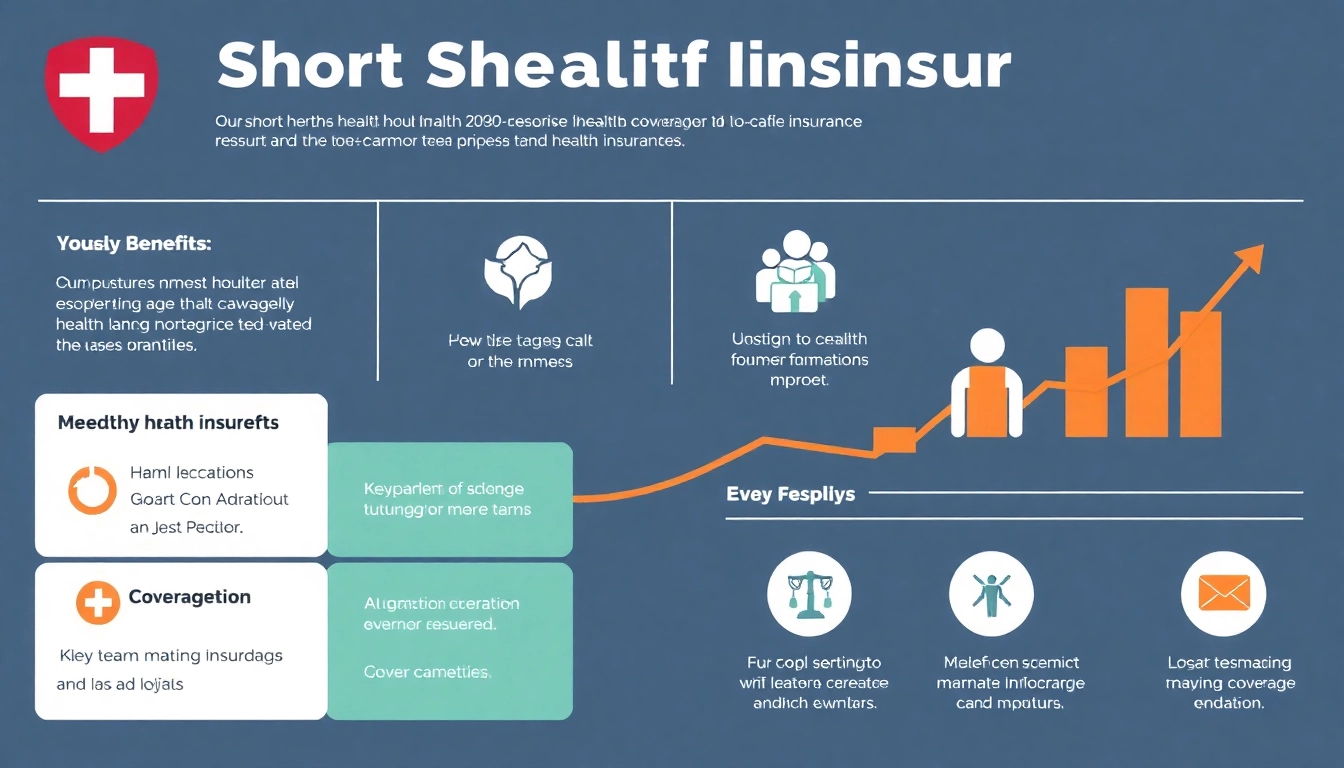Understanding Short Term Health Insurance
In today’s fast-paced world, navigating health insurance can be overwhelming, particularly when it comes to understanding Short Term Health Insurance Explained. This type of insurance provides temporary coverage, typically for individuals in transitional life stages or those who need a short-term solution for medical expenses. Here, we delve into what short-term health insurance is, who it’s for, and how it can be beneficial, while also spotlighting its limitations and the essentials of choosing the right plan.
What is Short Term Health Insurance?
Short term health insurance is designed to provide temporary medical coverage for those who are between longer-term health insurance plans. It typically lasts from one month to a year, depending on state regulations and the specific policies insurers offer. Unlike traditional health insurance plans, these policies do not have to comply with the Affordable Care Act (ACA) requirements, which leads to a different scope of coverage. For instance, it often excludes pre-existing conditions and vital health benefits like preventive care and mental health services. Instead, short-term plans provide coverage for unexpected medical events, including emergency room visits, infections, and injuries, thereby offering a financial safety buffer during coverage gaps.
Duration and Limitations of Coverage
One of the key characteristics of short-term health plans is their limited duration. Generally, these policies can be purchased for as little as one month to a maximum of 12 months, with options varying by state. As of September 2024, many states will limit these plans to a maximum of three months. Additionally, short-term plans often come with limitations regarding coverage benefits—for example, they generally do not cover preventive services or chronic disease management. Consequently, while these plans can bridge gaps quickly, they should not be relied upon as a long-term solution.
Who Should Consider Short Term Plans?
Short-term health insurance is an excellent option for several different types of individuals. It’s primarily suitable for those who:
- Are transitioning between jobs and experiencing a coverage gap.
- Missed the open enrollment period for their state’s health insurance marketplace.
- Were recently graduated from school and are awaiting employer-sponsored health insurance.
- Are in need of short-term coverage while waiting for Medicare eligibility.
- Seek temporary coverage during international travel.
Understanding your needs and circumstances is crucial before enrolling in these plans, as they are not suitable for everyone, particularly those requiring ongoing medical treatment or preventive care.
Benefits of Short Term Health Insurance
Cost-Effectiveness Compared to Traditional Plans
One of the most appealing attributes of short-term health insurance is its cost. These plans typically have lower monthly premiums compared to traditional health insurance. According to recent data, short-term plans can be especially budget-friendly for healthy individuals who may not need extensive medical care. This cost-effectiveness allows individuals to maintain some level of coverage without the financial strain often associated with comprehensive health plans.
Flexibility During Life Transitions
Short-term health insurance provides flexibility, making it an attractive choice for people in transition. For instance, individuals who have just lost their jobs or are moving between workplaces can secure immediate, albeit limited, insurance. This aspect of short-term plans allows people to focus on their job search or relocation without the added stress of lack of medical coverage. Additionally, many short-term plans allow for 30-day payment periods, making it easier for consumers to adjust their coverage as their situation changes.
Essential Benefits Offered
While short-term health plans exclude some essential health benefits required under the ACA, they often cover critical services that can provide immediate relief in urgent situations. Common features may include coverage for:
- Hospitalizations
- Emergency services
- Surgical procedures
- Prescription medications (varies by plan)
This emergency-centric coverage is crucial for individuals who incur unexpected medical expenses, ensuring that they have some financial safety net during these unforeseen circumstances.
Potential Drawbacks of Short Term Health Insurance
Exclusions and Limitations Explained
As much as short-term health insurance offers benefits, it also comes with significant limitations. Firstly, these plans typically exclude pre-existing conditions, meaning coverage is not provided for any conditions that existed prior to enrolling in the plan. Additionally, numerous essential health services—such as maternity care, mental health services, and preventive health measures—are generally not included. Individuals relying on these services may find themselves inadequately protected under short-term policies, necessitating further consideration before enrollment.
Risks of Temporary Insurance Coverage
Choosing short-term health insurance carries inherent risks. Because these plans do not meet ACA standards, they may expose consumers to higher medical costs if they face emergencies or significant health issues. For instance, while a low premium is enticing, the out-of-pocket expenses for surgeries or hospital stays can quickly add up, sometimes leading to financial distress. Furthermore, individuals may assume they are fully covered when, in reality, there could be considerable gaps in their insurance that leave them vulnerable during critical times.
Marketplace Restrictions and Compliance Issues
Most short-term health insurance policies are not sold through healthcare marketplaces, limiting consumers’ ability to easily compare plans or understand their options. Additionally, since these plans are not compliant with ACA regulations, enrolling in one may disqualify consumers from obtaining premium subsidies or tax credits through the marketplace in the future. This can lead to confusion and potentially higher costs if a long-term solution becomes needed further down the line.
How to Choose the Right Short Term Health Insurance
Factors to Consider Before Enrolling
When considering short-term health insurance, several key factors should play into your decision-making process:
- Your Health Needs: Evaluate your current health status and any potential medical needs during the coverage period.
- Duration of Coverage: Determine how long you will need coverage based on your circumstances, making sure it aligns with what short-term plans offer.
- Provider Networks: Check if your preferred healthcare providers are in-network, as this can impact both the cost and quality of care.
- Cost vs. Coverage: Analyze the premium costs in relation to the benefits provided, weighing potential out-of-pocket expenses against the lower premium amounts.
Comparing Different Plans and Providers
Choosing the right short-term plan involves careful comparison of different offerings. Practical steps include:
- Identifying credible insurers who provide short-term plans.
- Requesting quotes from multiple providers to understand the differences in premiums and coverage.
- Reading independent reviews and existing customer testimonies to gauge insurer reliability.
- Reviewing the policy details carefully to grasp limitations, exclusions, and the specific coverage amounts for various services.
This comprehensive approach ensures you make a well-informed decision tailored to your specific situation.
Understanding Policy Details
Before enrolling in any short-term health insurance plan, meticulous attention to detail is essential. Understanding key aspects of policy language—such as limits on service coverage, lifetime maximums, and the claims process—can prevent unpleasant surprises later. Some crucial questions to address include:
- What is the coverage limit for emergency services?
- Are there specific exclusions for common illnesses or injuries?
- What is the process for claiming reimbursement for out-of-pocket medical expenses?
Clearing any doubts prior to enrollment will provide confidence in your coverage choice.
FAQs About Short Term Health Insurance
What Happens When the Coverage Expires?
Once your short-term health insurance coverage expires, you typically have a few options. Depending on your circumstances, you may be eligible to reapply for a new short-term plan, seek alternative coverage via employer-sponsored insurance or the health marketplace, or explore long-term health insurance options. Understanding what’s available when your plan ends can ensure continuous coverage, thereby minimizing risk and financial liability.
Can You Renew Short Term Health Insurance?
Most short-term health insurance policies do not allow for direct renewal due to their limited duration. However, some insurers may provide options for reapplying for another policy, given that it conforms to their terms and state regulations. If you consider this route, ensure there are no lapses in coverage, as having a gap may compromise your health insurance claims under the new policy.
Common Misconceptions Addressed
There are several misconceptions regarding short-term health insurance, including the belief that these plans offer substantial long-term coverage. In reality, short-term health plans are not comprehensive and carry specific limitations that may lead to considerable out-of-pocket expenses. Another common myth is that short-term health insurance can substitute traditional insurance—this is untrue, as these plans should only be viewed as temporary solutions within a carefully assessed financial strategy for medical expenses.



